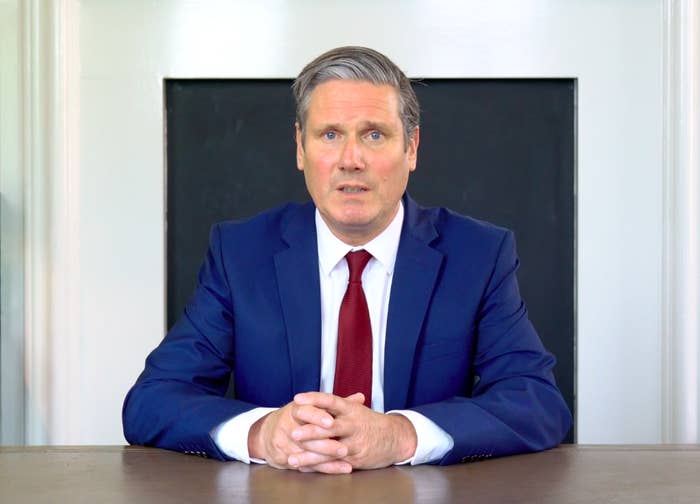
BuzzFeed News has reporters across five continents bringing you trustworthy stories about the impact of the coronavirus. To help keep this news free, become a member and sign up for our newsletter, Outbreak Today.
Labour leader Keir Starmer called for "clear directions" from the government on its coronavirus lockdown exit strategy in his first televised address to the nation since being elected to lead the party a month ago.
It followed the prime minister facing pressure in the House of Commons earlier on Monday when he presented MPs with his lockdown exit strategy.
Boris Johnson laid out some details from the government's "road map" in a televised address to the nation Sunday night ahead of a statement in Parliament the next day, where members were able to scrutinise the details in the 60-page document.
However, there was confusion surrounding the details on Monday morning, with people unsure about which employees would be expected to work, what the guidelines were on social distancing and households, and how the measures would differ across the devolved UK, among other questions.
Foreign secretary Dominic Raab added to the confusion after giving incorrect information about meeting relatives in a radio interview on Monday morning.
The Labour leader — while supporting lockdown measures — has consistently called for the government to publish details of its plans to get the country moving again safely.
In his televised statement, which was first broadcast on BBC Radio 4, Starmer criticised the prime minister for leaving people with unanswered questions and failing to provide "clear directions" for exiting the lockdown.
The Labour leader also said the government had failed to provide assurances that the UK's testing programme was fully up to speed and that those who had been asked to return to work would be safe to do so.
"What we needed from the prime minister last night was clarity and reassurance," Starmer said. "We needed to hear that nobody would be asked to go to work or send their children to school without it being safe to do so.
"We needed to know that the huge problems we’ve seen with protective equipment are over. That the crisis in our care homes has finally been gripped. That everybody who needs a test can finally get one. Above all, we needed to know when we could see our loved ones again.
"The prime minister said he was setting out a road map — but if we’re to complete the journey safely, a road map needs clear directions. So many of us have questions that need answering."
Following Johnson's speech on Sunday, trade union leaders and opposition politicians said the government had failed to provide adequate guidance on how employees could be kept safe.
Trades Union Congress leader Frances O'Grady said: "The government still hasn’t published guidance on how workers will be kept safe. So how can the prime minister — with 12 hours’ notice — tell people they should be going back to sites and factories? It’s a recipe for chaos.”
Johnson faced criticism from MPs in the House of Commons chamber earlier in the day, including from Starmer ahead of his televised address.
"What the country needs at this time is clarity and reassurance, and at the moment both are in pretty short supply — and at the heart of the problem, it seems, is that the prime minister made a statement last night before the plan was written, or at least finalised, and that has caused considerable confusion," Starmer said.
He pointed out that on Sunday, people were told to return to work from Monday, but when the detailed document was published, it said that these instructions did not apply until Wednesday — and that safety guidelines were still yet to be published.
Starmer asked whether the guidelines would be published on Tuesday, adding: "If not, is he seriously asking people to go back to work without the guidelines?"
In response, Johnson said that "plenty of businesses" have already been proceedings "in a way that respects social distancing, that is as COVID-compliant as possible," and said that the guidelines would be published on Monday night.
The Scottish National Party's Westminster leader, Ian Blackford, also criticised a lack of clarity, saying that "mixed messaging risks lives".
He added, "It is obvious that the last 24 hours has fed confusion; what the public desperately needs today is to be given some clarity."
He also pointed out that the devolved nations have not moved away from the message to stay at home to protect the NHS and save lives, and that the new slogan had not been shared with leaders of the devolved administrations, who had found out about the change of messaging from the Sunday newspapers.
Plaid Cymru MP Liz Saville-Roberts added to Blackford's criticism, saying: "I understand the sense of optimism the prime minister wishes to convey, and I understand that people need hope, but we must not forget that over 31,000 people are dead."
She said there was a "three-nations approach", with Scotland, Wales, and Northern Ireland agreeing on an approach and the prime minister acting as the "prime minister of England".
Johnson said, "I reject that completely", adding that his plan was "perfectly good advice for the whole of the United Kingdom".
Former Labour leader Jeremy Corbyn added his own criticisms, saying that Johnson's statement had "given a carte blanche to many employers to try and force people to come back to work without proper consideration of their health and safety, without consideration of the dangers that they're going to suffer in travelling to work".
Corbyn said that easing restrictions while the death rate and infection rate are still at current levels "will probably make the situation worse, not better".
In response, Johnson said there had only "been a change of emphasis" and that people should go to work provided that their workplace and the transport networks that get them there are "COVID-secure".

